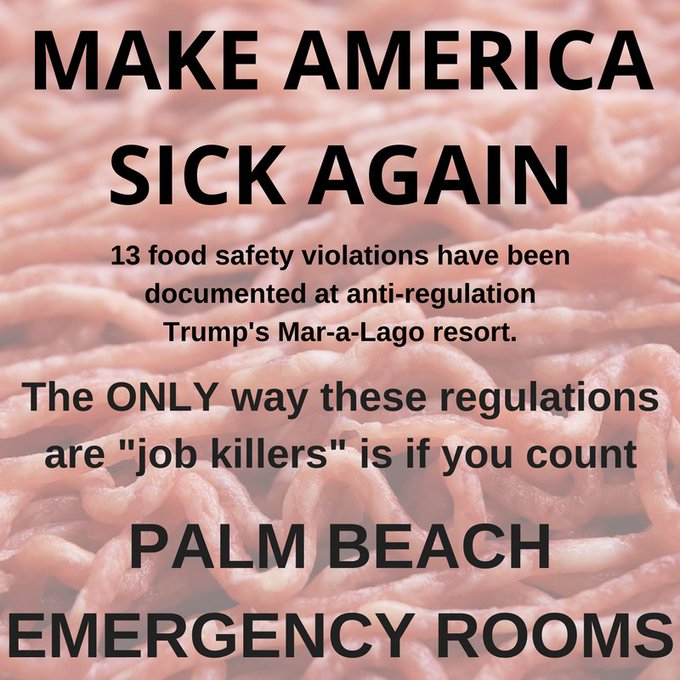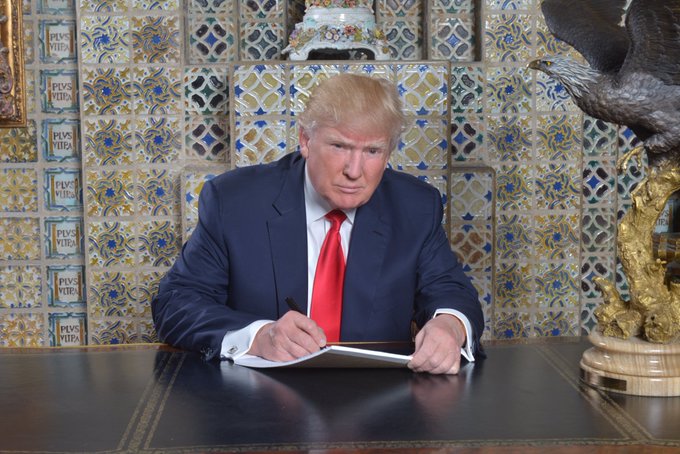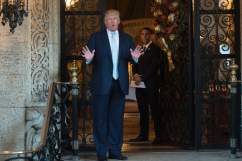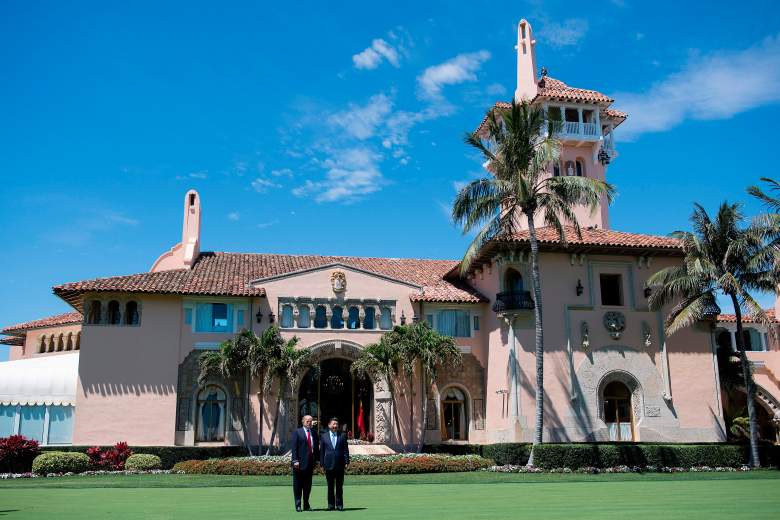
US President Donald Trump (L) and Chinese President Xi Jinping (R) at Mar-a-Lago, the “Winter White House.” (Getty)
In January, mere days before Japanese Prime Minister Shinzo Abe met with Donald Trump at the president’s Mar-a-Lago private club in Palm Beach, Florida, state health inspectors conducting a routine inspection found potentially dangerous conditions in the club’s kitchen facilities, according to a story first reported by the Miami Herald on April 12.
Here’s five things you need to know:
1. Three of the Health Violations Were Deemed “High Priority”
The inspection report information listed at MyFloridaLicense.com, a website run by the state’s Department of Business and Professional Regulation, lists 10 violations in all: three classified as high priority violations (which the DBPR defines as “those which could contribute directly to a foodborne illness or injury. High Priority lodging violations are those which could pose a direct or significant threat to the public health, safety, or welfare”), three intermediate violations (“those which, if not addressed, could lead to risk factors that contribute to foodborne illness or injury. Intermediate lodging violations are those which relate to specific actions, equipment or procedures that contribute to the occurrence of a high priority violation if left unaddressed”), and four basic violations.
Despite these violations, the report lists the result of the inspection as “Met Inspection Standards During This Visit,” presumably because all the problems identified by the inspectors were either “Corrected On-Site” or had “Corrective Action Taken,” according to the report.
The most serious high-priority violations involved the improper storage of meat and fish. Violations 03A-15-4 and 03A-16-4 listed foods stored in either reach-in or walk-in coolers kept at temperatures higher than 41 degrees Fahrenheit. (The report notes that a technician said the walk-in cooler had been set on “defrost and has corrected the problem.”) The two cooler violations were listed as “corrected on-site” or “corrective action taken.”
The third high-priority violation, 01D-01-4, said “Nonexempt fish offered raw or undercooked has not undergone proper parasite destruction. Fish must be fully cooked or discarded.” That problem was also listed as “corrected on-site.”
Other listed violations included freezers with rusty shelves, lack of hot water at the employees’ handwashing sink, lack of a handwashing sign at the sink, and similar issues.
2. Trump’s Presidential Status Might Explain the Club’s Lagging Standards
Shortly before Trump’s inauguration, he tweeted a message referring to Mar-a-Lago as the “Winter White House,” a nickname which has been adopted by multiple media outlets to refer to the property.
Ironically, this very elevation in status – from private citizen’s private club to semi-official presidential retreat – might be the cause of the declining standards in the club’s kitchen facilities.
The Miami Herald reports that before becoming a politician, Trump used to be personally involved in the club’s day-to-day operations, even checking out the kitchen and giving directions to low-ranking club employees. During this time, Mar-a-Lago regularly passed inspections with what the Herald called “flying colors,” usually racking up only one or two minor violations each time.
But as Trump’s political activities increased, so did the violations at Mar-a-Lago: two violations in 2015, compared to 11 last year.
3. Palm Beach County is Considering a Special Tax to Cover Cost of Trump’s Presidential Visits
Being home to the “Winter White House” has proven very expensive for the taxpayers of Palm Beach County. On April 10, two days before the Miami Herald broke the news about Mar-a-Lago’s health-inspection issues, the Associated Press reported that county commissioners were considering levying a special tax against the property, unless the federal government provides reimbursement.
The bulk of those extra costs involve providing presidential-level security. County officials told the AP that each presidential visit to Mar-a-Lago costs local taxpayers more than $60,000 per day, mostly to cover overtime costs for law enforcement. Sheriff Ric Bradshaw estimated that Trump’s Mar-a-Lago meeting with Chinese President Xi Jinping cost the county $250,000. As a result, county commissioner Dave Kerner floated the idea of turning Mar-a-Lago into a special taxing district, with special taxes levied on the club to cover presidential security costs.
Right now, Mar-a-Lago actually pays lower taxes than a similarly sized hotel, because it is incorporated as a private club.
Club membership for Mar-a-Lago currently costs $14,000 in annual dues plus a $200,000 initiation fee.
4. Mar-a-Lago’s Winter White House Status Also Hurts Local Businesses
While hosting the “Winter White House” has increased security costs for Palm Beach taxpayers, it has simultaneously lowered the amount of tax money the county can collect from local businesses – because so many local businesses have to reduce operations if not shut down completely whenever the President of the United States comes to town.
In mid-February, after the still-newly inaugurated President Trump has spent his third consecutive weekend at Mar-a-Lago, NPR reported that the Palm Beach County Park Airport, located only six miles from Mar-a-Lago, had to shut down every time the president or president-elect came to town, because Federal Aviation Administration regulations ban all flights out of the airport during those times. (Such rules apply to all sitting U.S. presidents, and are not exclusive to Trump.) Every time that airport shuts down, all businesses connected tot he airport must close as well.
NBC News calculated that, as of April 13, Trump has spent seven of his 13 weekends as president at Mar-a-Lago.
5. Ethical and Security Concerns Surround the “Winter White House”
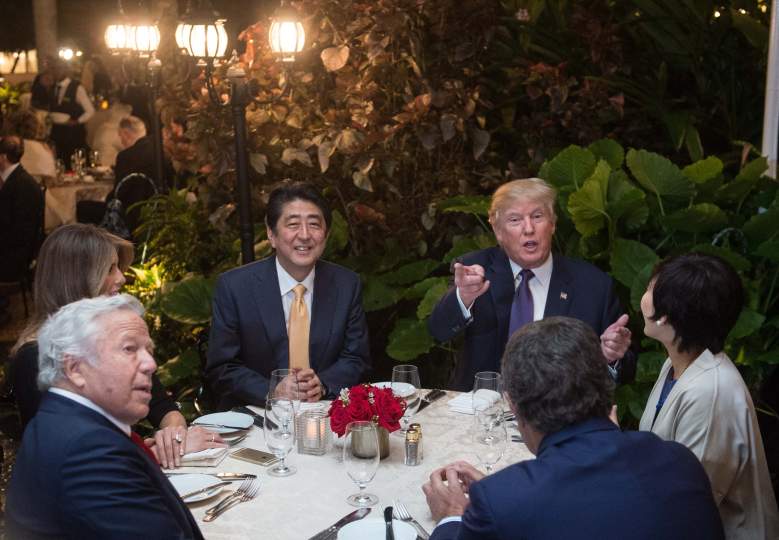
US President Donald Trump hosts Japanese Prime Minister Shinzo Abe in the dining room at Mar-a-Lago (Getty)
On March 24, Democrats in the Senate introduced a bill called the “Make Access Records Available to Lead American Government Openness Act” – a clunky name presumably chosen because its acronym spells out “MAR-A-LAGO Act.” If passed, the legislation would require Trump’ administration to publish visitor logs for the White House or “”or any other location where President Trump regularly conducts official business.”
At the time, New Mexico Senator Tom Udall said in a prepared statement that “the American people have a right to know who has access to the president and who has leverage over this administration.”
On April 10, three groups filed a lawsuit against the Department of Homeland Security (which oversees the Secret Service, which in turn oversees the visitor logs), demanding the release of records showing who has been visiting Trump in his official capacity as president.
One of the co-plaintiffs, Citizens for Responsibility and Ethics in Washington (or “CREW”), released an April 13 statement on its website saying, in part, that
While visitors to the White House have to undergo an extensive vetting process, visitors and members of the Mar-a-Lago resort– where, as of March 28, the president had spent half of all of his weekends since taking office – only have to give a photo ID. When the president is on the property, guests must pass through several Secret Service checkpoints, but those merely ensure immediate physical safety by screening for weapons or bombs. Ultimately, access to the club, and by extension the commander in chief, is open to anyone who can afford the $200,000 membership fee, or who can get a member to invite them in. This opens the door to a host of national security concerns and, because there is no record of who has engaged with the president and few restrictions as to who can enter the club, to transparency concerns and ethical issues regarding “pay-to-play” lobbying. … The executive office has also remained mum about whether it will release White House visitor logs, which the Obama administration began doing in 2009 following a series of lawsuits by CREW.
In February, after hosting Japanese Prime Minister Shinzo Abe at Mar-A-Lago, Trump faced criticism for discussing sensitive national-security topics in a dining room open to anyone who can afford to pay Mar-A-Lag’s stiff membership and initiation fees.
This incident inspired Senators Tom Udall and Sheldon Whitehouse to release a joint statement criticizing Trump’s actions during the event:
Two weeks ago, we asked for a list of the members who are paying $200,000 a pop to gain access to President Trump at his Mar-a-Lago ‘Winter White House’. We asked about what steps were being taken to screen members and guests to ensure they presented no security risks. We’ve heard nothing.
This weekend, CNN reported that the President was ‘swarmed’ with club guests. We saw pictures strewn about social media by Mar-a-Lago guests mugging for the camera with the nuclear football. Worst of all, we learned that guests in the Winter White House dining room were treated to the President’s discussion of a North Korean missile launch with a foreign head of state, replete with sensitive documents strewn about the dinner table.
During the campaign, we listened to month upon month of Donald Trump complaining about the handling of important national security information. We’ve had years of inconclusive investigations by House Republicans over emails and classified documents. Now we have unknown and unvetted Mar-a-Lago members looking over the President’s shoulder as he conducts our foreign policy.
This is America’s foreign policy, not this week’s episode of Saturday Night Live. We urge our Republican colleagues to start taking this Administration’s rash and unprofessional conduct seriously before there are consequences we all regret.
